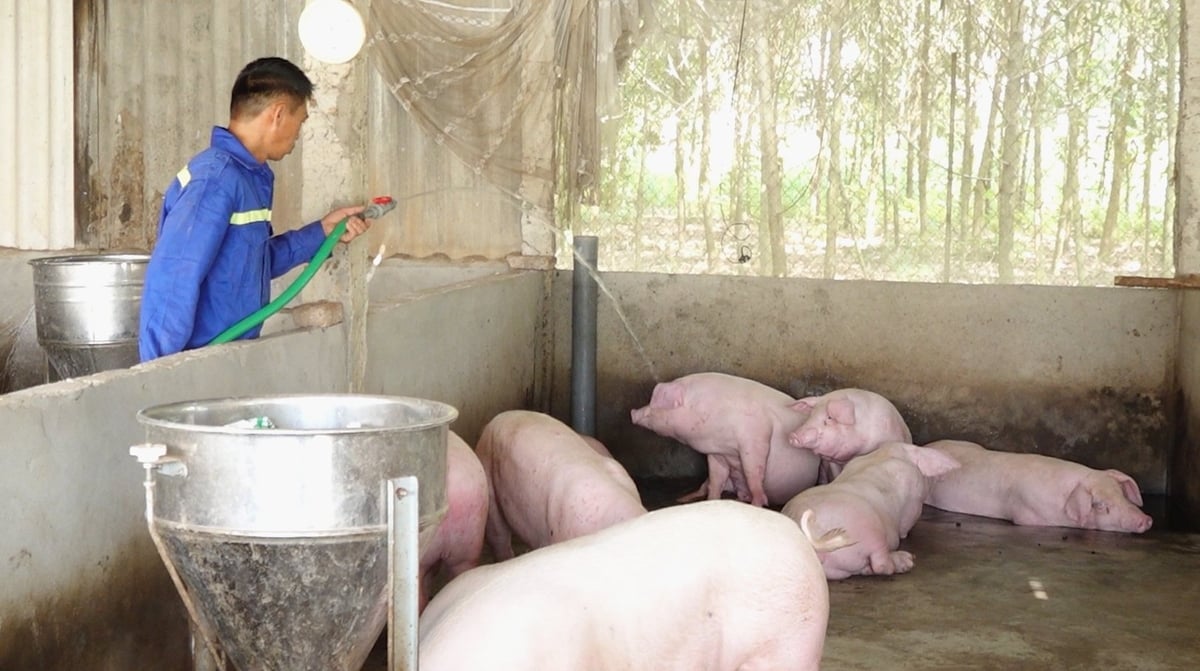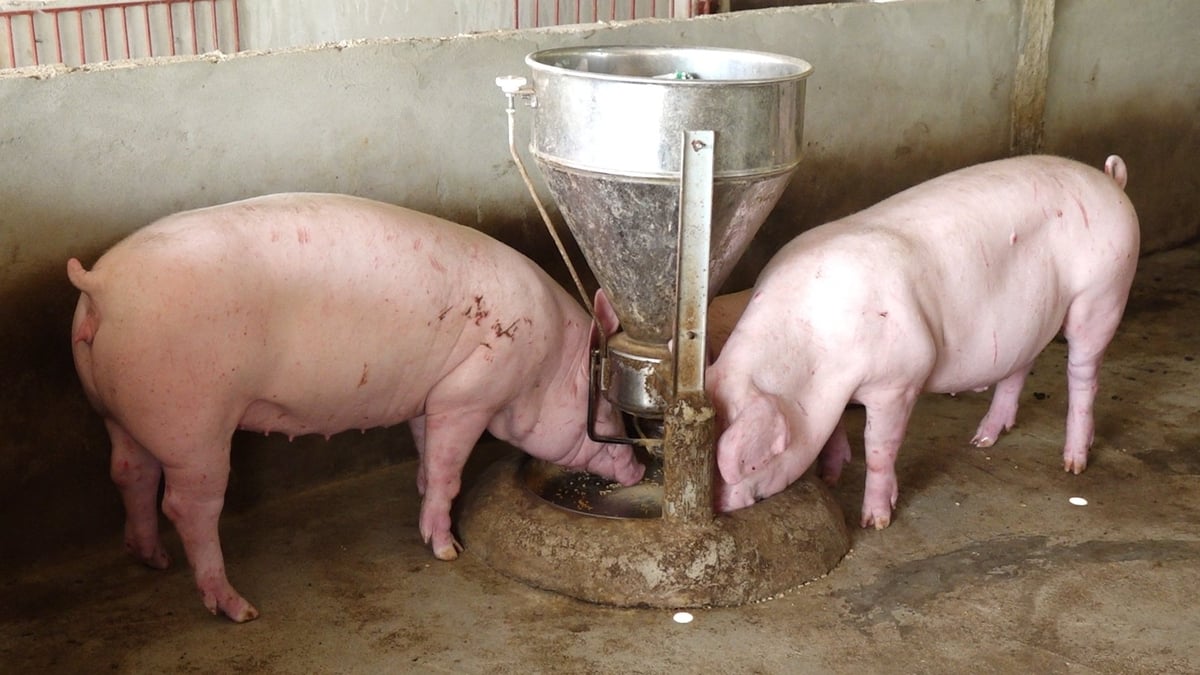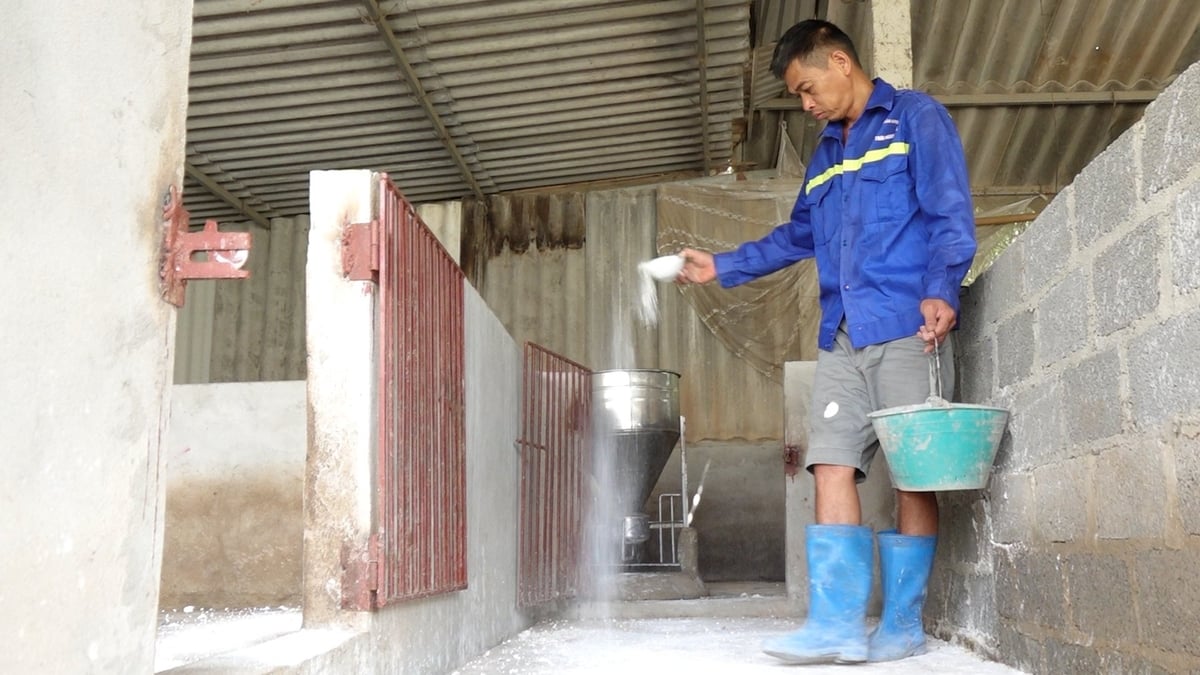December 30, 2025 | 20:34 GMT +7
December 30, 2025 | 20:34 GMT +7
Hotline: 0913.378.918
December 30, 2025 | 20:34 GMT +7
Hotline: 0913.378.918

Do Van Le (Nam Hoa commune, Thai Nguyen province) has successfully sold a herd of 25 pigs vaccinated with Dacovac-ASF2. Photo: Quang Linh.
African swine fever (ASF) has been the biggest fear for pig farmers in Vietnam, particularly those farming on a small scale. The disease not only causes heavy losses but also leaves many families penniless and void of capital.
Nam Hoa commune in Thai Nguyen province constantly suffers from disease outbreaks, which have severe consequences for livestock farmers. However, in the center of the epidemic area, the story of Do Van Le, a local livestock farmer, has opened a new direction with a practical approach. He practices non-contact livestock farming techniques combined with the use of the Dacovac-ASF2 vaccine.
Through the media and an introduction from a veterinary pharmacy in the commune, he learned about the Dacovac-ASF2 vaccine, a product to prevent African swine fever researched and produced by Dabaco Vietnam Group. At first, this old farmer still had certain doubts and hesitation toward the new vaccine, but the risk of an epidemic that could strike at any time would not leave his mind. He decided to give it a try by vaccinating 25 of 50 pigs in the family’s herd.
After 2 - 3 weeks, Le noticed a clear difference between the two groups of pigs. The unvaccinated group began to show signs of a lack of appetite, slow growth, and one of them died. Meanwhile, the 25 vaccinated pigs continued to eat normally and grow well.
“The weather is hot during the changing season, and the risk of disease outbreaks in livestock, especially African swine fever, is very high. Some households in this area have not vaccinated their pig herds, so the disease broke out, causing heavy damage,” he said.

Pigs vaccinated with Dacovac-ASF2 are healthy and growing well. Photo: Quang Linh.
Currently, Le's vaccinated pigs have an average weight of nearly 100 kg/head. With the market price ranging from VND 63,000 to 65,000/kg, he expects to earn a profit of VND 1 million/head after deducting the cost of feed, vaccines and care. He plans to keep using this vaccine for the next batches.
Le was once a man hesitant to try new products, but now his farm has become a trusted address for many people in the area to learn from. He regularly shares with other livestock farmers the benefits of combining Dacovac-ASF2 vaccination with “no-contact” farming techniques, a model suitable for small-scale farming households.

Do Van Le's farm applies the “no-contact” farming techniques for biosecurity, using a net system to prevent insects and wild animals and lime roads. Photo: Quang Linh.
“No-contact” farming is a technique researched and summarized by Amafarm Breeeds One Member Limited Company to adapt to African swine fever. This method includes many technical measures, such as building a net system to prevent insects, wild animals, and rats, disinfecting feed before putting it in the barn, and minimizing direct contact between humans and animals. It not only strengthens the effectiveness of African swine fever prevention work but also contributes to protecting livestock from other infectious diseases.
In order to apply the techniques effectively, farmers need to invest in a net system, build closed canals containing lime water for disinfection, strictly implement the procedure of spraying disinfectants to cleanse the barns, and limit strangers from entering and leaving the farming area.
Thanks to their proactive and flexible approaches to new science and technology, farmers like Do Van Le have not only succeeded in protecting their livestock from disease but also created confidence among community members regarding the ability to stay safe amidst African swine fever outbreaks by using vaccines and appropriate techniques. This is also the key for the pig farming industry to overcome challenges and move towards sustainable development gradually.
Dacovac-ASF2 is the third African swine fever vaccine in Vietnam to be licensed for commercial circulation by the Ministry of Agriculture and Environment. The licensing not only confirms the effectiveness and safety value of the product but also opens up important options for farmers in the fight against this dangerous disease.
Translated by Samuel Pham

(VAN) Located in three former provinces, Nam Dinh, Thai Binh, and Ninh Binh, and now in two provinces, Ninh Binh and Hung Yen, "Red River Delta" is the name of Vietnam's first interprovincial coastal wetland World Biosphere Reserve.
/2025/12/29/1046-1-210728_624.jpg)
(VAN) In 2025, Viet Nam recorded severe and extreme disasters, breaking multiple historical records and causing heavy losses in lives, property, and infrastructure nationwide.

(VAN) Applied technologies, water-saving irrigation is a strategic solution to promote climate-resilient agriculture and strengthen water security in the uplands.
/2025/12/29/3936-3-163422_251.jpg)
(VAN) Can Gio mangrove forest in particular and the entire Can Gio Mangrove Biosphere Reserve in general hold great potential for carbon credits.

(VAN) Chu Pah Rubber has announced its products that comply with the EU Deforestation Regulation (EUDR), affirming its commitment to sustainable production and product origin transparency.

(VAN) Deputy Director Nguyen Hoai Nam stated that a digital data platform will be developed with agricultural sector databases, utilizing AI to help farmers make informed decisions on 'watering correctly, sufficiently, and efficiently.’
/2025/12/29/4841-2-134224_777.jpg)
(VAN) From only about 10 individuals in 2009, the wild elephant population in Dong Nai has recovered to nearly 30 animals after more than 10 years.